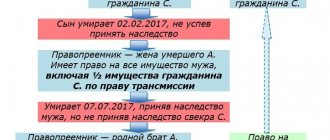The rules of inheritance in the Russian Federation are regulated by the norms enshrined in the legal documents of the state. Therefore, all disputes arising between heirs about legality and legality must be resolved in a strictly established manner.
At the same time, according to Article 1117 of the Civil Code of the Russian Federation, the heir may be considered unworthy of the property. Lawyer Oleg Ustinov will tell you today how to prove the dishonesty of such a person in 2021 legally and prevent the transfer of the testator’s property to him.
How to recognize an heir as unworthy
Based on the practice of lawyers on our website about inheritance, quite often, citizens who claim property by inheritance do not deserve it because of their unworthy lifestyle (prisoners, people suffering from drug or alcohol addiction, etc.) or behavior, which can be regarded as any negative action directed at the testator himself.
This fact is the basis for their exclusion from the list of heirs. However, this can only be done after obtaining a court permit that establishes the citizen’s unworthiness.
Note
Without obtaining the appropriate injunction, it is impossible to exclude a potential heir from the circle of inheritance on the basis of his unworthiness!
In addition, it should be noted that filing a lawsuit to declare an heir unworthy is possible only for those persons who inherit the property of the testator by law. Thus, citizens listed as heirs in the contents of the will do not have the right to sue, even if they have irrefutable evidence.
Download the statement of claim for declaring the heir unworthy
Why recognize a citizen as unworthy of inheritance?
Unfortunately, lawyers are increasingly faced with situations where people inheriting property allow themselves to treat it in an unacceptable manner (misleading, blackmailing, evading their direct responsibilities, etc.).
In this situation, the law of the Russian Federation provides for the possibility of conducting a judicial procedure, the main purpose of which is to recognize the heir as unworthy of the inherited property.
ARTICLE RECOMMENDED FOR YOU:
Does the daughter-in-law have the right to her mother-in-law's inheritance?
At the same time, for other persons included in the circle of heirs, recognizing one of them as unworthy in any case brings financial benefits. After all, the share of property that is intended for a person excluded from the inheritance will most likely be divided in proportion to their shares in the inheritance.
Expert opinion
Oleg Ustinov
Practicing lawyer, author of the website “Legal Ambulance”, one of the co-founders of the “Our Future” foundation.
In certain situations, the division of the “additional” share of property may be carried out differently. As a rule, this is only possible if the testator himself indicates the rules of division in the content of the “last will”. For this reason, the Legal Ambulance website recommends that heirs carefully read the rules for the division of property and check their relevance in accordance with the letter of the law.
If the heir is recognized as unworthy after accepting the inheritance, this citizen will be obliged to return all inherited property in full within the period established by the court.
Category of unworthy heirs
According to the existing legislation of the Russian Federation, in 2021 there are several types of such heirs. Thus, the following groups are provided as grounds for recognition as unworthy :
- The first group includes persons who wish to inherit property in an unlawful way. The law classifies such citizens as those who have committed or are committing any illegal actions against the testator himself or other claimants to property in order to increase their own share or obtain one. Such heirs lose the right of inheritance both by law and by will.
- The second category includes the so-called unscrupulous parents who were deprived of their parental rights in court. So, if parents do not have such rights at the time of opening the inheritance case, then they do not have the right to claim property by inheritance. The prerequisite for denial of parental rights today is the refusal to fulfill the responsibilities of a parent in relation to children (for example, non-payment of child support, evasion of child support, physical or mental abuse, etc.).
- Finally, the law includes in the third category of unworthy heirs persons who were deprived of the right to inherit property according to a court decision. This most common group includes citizens who do not provide proper care and do not perform other duties related to the testator.
ARTICLE RECOMMENDED FOR YOU:
What documents are needed to enter into an inheritance?
It is worth noting that not only the heirs, but also the testator himself during his lifetime can receive the court decision mentioned above.
Unfortunately, Russian legislation does not yet have a clearly defined list of crimes for declaring an heir unworthy. Today, this can be regarded as both an attempt on life and intentional harm to health (for example, providing bad products or medicines).
In addition, when proving the guilt of the heir, the court does not take into account the motives themselves, as well as their consequences. One fact of carrying out illegal actions is enough to pass a verdict on proof of unworthiness.
General provisions of inheritance law
1.
By guaranteeing the right of inheritance (clause 4 of article 35 of the Constitution of the Russian Federation), the state establishes a legislative system for ensuring the said constitutional right.
Inheritance law in the objective sense is a set of legal norms governing the transfer of rights and obligations from the deceased to other persons (hereditary relations and relations related to inheritance).
Inheritance law in the subjective sense, on the one hand, is the right of a citizen to transfer his property rights and obligations to his heirs, on the other hand, the right to receive property rights and obligations as an inheritance from the testator (the right of inheritance).
2.
An inheritance legal relationship arises with the opening of an inheritance (after the death of a citizen) and ends with the acceptance of all inherited property. Inheritance legal relations are intermediate in nature from death to the legal acceptance of the inheritance, and they have a kind of retroactive effect. As soon as a citizen has acquired an inheritance, and his right to this arises from the moment of the death of the testator, it does not matter how much time has passed, i.e. how long the inheritance lasted - six months, a year, two - it belongs to him from the moment of the death of the testator.
3.
Of course, the basic principles (principles) of civil law, with certain specifics, also apply to inheritance legal relations.
But there are also principles of modern Russian inheritance law
. These include:
— freedom of will.
The testator has the right to bequeath property to any persons in any proportion, cancel and change the will;
— priority of a will over inheritance by law.
Inheritance by law occurs when there is no will, when the will is invalid in whole or in part, or when not all property is bequeathed. In such a legal structure, inheritance by law fills the gap associated with the absence of a formally expressed will of the testator;
— absence of quantitative and qualitative restrictions on inheritance of property;
— universality (integrity) of the hereditary mass.
Inheritance is a universal legal succession. Both the assets and liabilities of the testator are inherited: you cannot refuse part of the inheritance, you can accept the entire inheritance, including property and debts, or refuse it;
— calling to inheritance of persons entitled to an obligatory share
regardless of how inheritance occurs: by will or by law;
— maximum involvement of legal heirs in the inheritance process in the absence of disposal of inherited property.
There are eight lines of succession by law.
In this case, the subsequent queue inherits in the absence of the previous one
. Inherited by relatives both in descending and ascending lines of kinship, adopted children and adoptive parents, stepmothers, stepfathers and stepdaughters, stepchildren, disabled dependents;
— minimal participation of the state in inheritance legal relations.
Russia, its subjects and municipalities can be heirs under a will when there are no heirs of all eight orders under the law and there are no heirs under the will, and the property becomes escheated (passed to public entities).
4. Inheritance legislation
is a system of legislative acts regulating relations with the participation of citizens, legal entities, government bodies and municipal self-government, in relation to:
opening of inheritance;
disposition of property in case of death; the procedure for inheriting property in the absence of a disposition in case of death; acceptance and refusal of inheritance; protection and management of inheritance. The main provisions governing inheritance relations are contained in section. V Civil Code, which is called “Inheritance Law”.
Part one of the Civil Code, among other things, regulates relations closely related to inheritance law: the legal status of citizens (Chapter 3), the legal regime of objects (Chapters 6 - 8), transactions and representation (Chapters 9, 10), etc. d. Legal provisions contained in other laws may influence the dynamics of inheritance relationships. First of all, these are the Insurance Code, the Housing Code, and the Fundamentals of Notary Legislation. Resolution No. 9 of the Plenum of the Armed Forces of the Russian Federation is of utmost importance. The explanations contained therein contribute to the correct and uniform application of legal norms on inheritance.
5.
In accordance with Art.
1112 of the Civil Code , the inheritance includes things that belonged to the testator on the day the inheritance was opened, and other property, including property rights and obligations.
Of course, the inheritance mass (the composition of the inheritance) is not physically formed; we are talking about rights to specific objects, other property, as well as property obligations.
6.
Subjects of inheritance under circumstances established by law and the will of the heir can be citizens, legal entities and public entities.
The Civil Code (Article 1116) provides a list of persons who may be called upon to inherit. These include:
- citizens who are alive on the day of opening of the inheritance, as well as those conceived during the life of the testator and born alive after the opening of the inheritance (by law or by will);
- legal entities existing on the day of opening of the inheritance (only by will);
— Russian Federation, constituent entities of the Federation, municipalities (by law or by will);
— foreign states and international organizations (only by will).
7.
In Art.
1117 of the Civil Code defines the circle of citizens who do not have the right to receive an inheritance (unworthy heirs).
This list includes citizens who, by their illegal actions, contributed or attempted to promote their or other persons’ calling to inheritance or an increase in the share of the inheritance due to them or other persons. Illegal actions must be confirmed by a court verdict that has entered into legal force. Such actions are grounds for deprivation of the right to inherit only if these actions are intentional. This rule is not applicable to persons convicted of committing a crime through negligence.
Persons who have committed socially dangerous acts in a state of insanity are not recognized as unworthy heirs, since in this case they were deprived of the opportunity to be aware of their actions or to direct them.
It should be borne in mind that citizens to whom the testator bequeathed property after they lost the right to inherit have the right to inherit this property. Thus, the testator can “forgive” his unworthy heirs
.
Parents do not inherit by law after children in respect of whom they were deprived of parental rights and these rights were not restored at the time of opening of the inheritance.
In such cases, a separate court decision recognizing the heir as not having the right to inherit if the above grounds are present is not required. However, parents after children in respect of whom they have been deprived of parental rights are excluded from inheritance only when inheriting by law. According to the will of their children, who have reached the age of majority by the time the will is made, parents who were once deprived of parental rights inherit on a general basis, i.e. if specified in the will.
Based on clause 2 of Art. 1117 of the Civil Code, at the request of interested persons, the court excludes from inheritance citizens who have maliciously evaded their obligations under the law to support the testator
.
Features of the procedure for disinheriting unworthy heirs in 2021
Experienced lawyers insist that if misbehavior is discovered, the remaining heirs should not try to figure it out on their own. This is what the court is for. And although this procedure will take some time, it can be significantly reduced by using our instructions.
We prepare documents
In order to file a claim in court, the heirs need to prepare all the documents listed below:
- a written statement of claim declaring the heir unworthy of the inherited property, as well as its photocopies from the defendant himself and three persons;
- a receipt for successful payment of the state duty, the amount of which for 2021 is 300 rubles;
- documents (both originals and copies) confirming the circumstances of declaring a citizen unworthy (for example, complaints from work, statements from outstanding bank accounts, court decisions that were issued earlier, photographs, videos, etc.);
- a copy of the death certificate of the property owner;
- copies of documents that prove the legality of the inheritance by the plaintiff and the heir of the testator's property.
Let's go to court
After you have prepared a package of necessary documents, you must contact the local court office directly, where you will submit the documents in accordance with the procedure established by law.
After accepting the documentation, the court employee will tell you the date and time of the start of the court hearing, the result of which will be a decision to declare the defendant unworthy under Article 1117 of the Civil Code of the Russian Federation.
Working with a notary
If the judge satisfies your claim and the heir was found unworthy, all that remains is to provide the notary in charge of the inheritance case with one copy and the original of the court decision. Then the specialist will have to exclude the unworthy heir from the circle of applicants for the property.
ARTICLE RECOMMENDED FOR YOU:
Inheritance of a share in the authorized capital of an LLC
Let us remind you that this algorithm of actions is the only legal way to disinherit an unworthy heir! Take each step seriously. This is especially true for collecting documents and evidence.
Is it possible to restore the right of inheritance of an unworthy heir?
Every day in our practice there are more and more situations where the court recognizes an heir as unworthy. At the same time, in some cases, an applicant who has lost the right to inheritance may be recognized as a full heir.
Lawyer's Note
As one example, we can consider the discovery, after recognition of unworthiness, of a so-called repeated will, in the content of which this person is indicated as the main heir.
The presence of such a document indicates “forgiveness” of a person who has lost the status of a worthy heir. But a repeated will can be successfully challenged in court ! For example, if the heir restored to his rights again committed something against the testator. You can learn more about this from this video:
Bottom line
As you can see, other heirs can legally recognize an heir as unworthy only by taking advantage of the provisions of Article 1117 of the Civil Code of the Russian Federation and proving his bad faith by providing the notary with a court decision, to obtain which they must collect documents and evidence of their statements about the illegal actions of the heir.
Previous
Inheritance in the Russian FederationInheritance of a share in the authorized capital of an LLC
Next
Inheritance in the Russian FederationInheritance of weapons after death
Consequences of being declared unworthy and excluded from heirs
If an heir is found unworthy, the part of the inheritance that would have been due to such a fallen heir passes to the heirs by law called to inherit, in proportion to their inheritance shares.
However, in the case when the testator bequeathed all the property to the heirs appointed by him, the part of the inheritance due to the heir who fell away on the grounds of being considered unworthy passes to the remaining heirs under the will in proportion to their inheritance shares, unless the will provides for a different distribution of this part of the inheritance (clause 1 Article 1161 of the Civil Code of the Russian Federation).
Unworthy heirs who have been recognized as such are obliged to return all property that they unjustifiably received from the inheritance (clause 3 of Article 1117 of the Civil Code of the Russian Federation).






